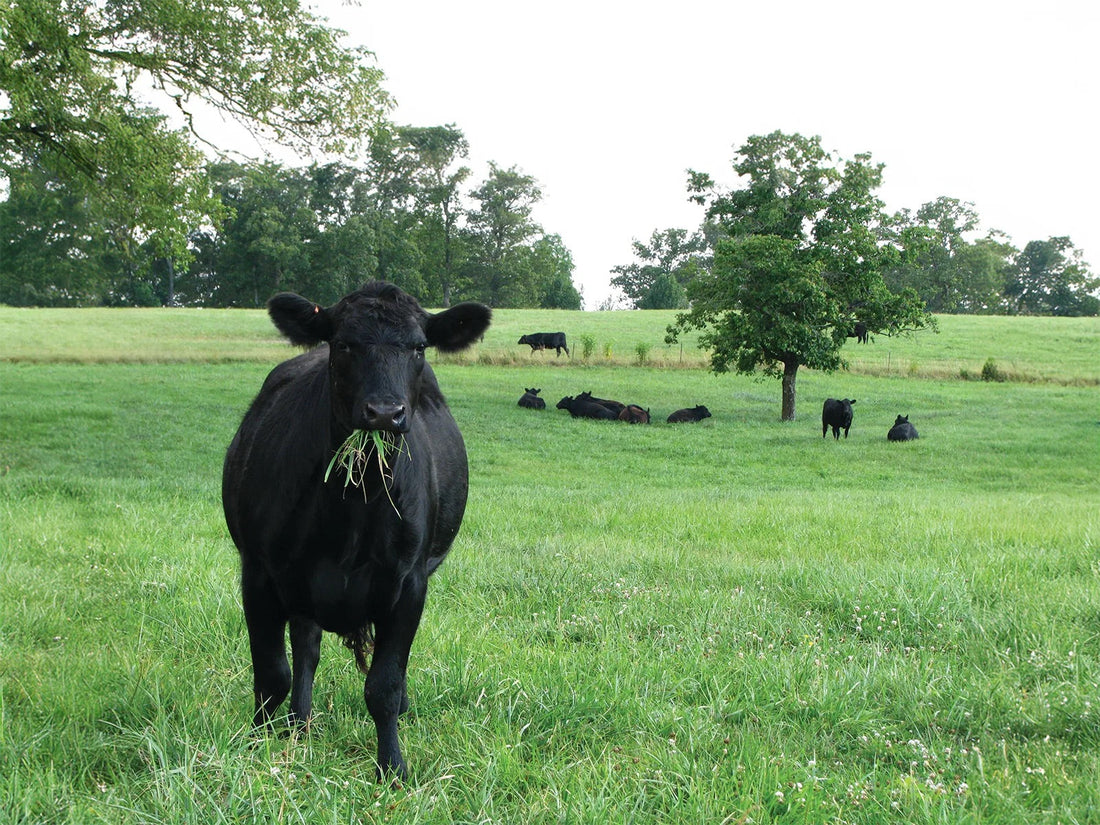
Regenerative Farming with Cattle: More Than Just a Trend at Accent Angus Farm
In recent years, “regenerative farming” has become a hot topic in the food and agriculture world. It’s trendy, it’s marketable, and it’s often used as a buzzword to justify higher prices for beef and steaks. Large meat distributors have been quick to jump on the bandwagon, splashing the term across their packaging and marketing campaigns as if it’s something brand new. But here’s the truth: regenerative farming — real regenerative farming — is far from new.
At Accent Angus Farm, we’ve been practicing these sustainable methods long before the term made its way into marketing meetings and food magazines. It’s not a trend to us; it’s simply the right way to farm, the way family farms like ours have done for generations.
What Is Regenerative Farming/Agriculture?
At its core, regenerative farming/agriculture is about restoring and enhancing the health of the land. Real regenerative cattle farming is about working with nature, not against it. It's about raising livestock in a way that heals the land — not strips it bare. When raising cattle, it involves managing pastures in a way that improves soil health, increases biodiversity, enhances water cycles, and ultimately leaves the environment better than we found it. It’s about more than just avoiding harm — it’s about actively rebuilding the natural systems that make farming possible.
Key principles of regenerative cattle farming include:
-
Rotational grazing: Moving cattle between pastures regularly so grasses can regrow and soil can recover.
-
Diverse pastures: Planting and maintaining a variety of grasses and plants that support soil health and wildlife.
-
No chemical use: Letting natural systems do the work rather than relying on synthetic fertilizers and pesticides.
-
Building soil carbon: Managing cattle and pastures in ways that increase the amount of carbon stored in the soil, helping to fight climate change.
When done correctly, regenerative farming/agriculture creates richer soils, cleaner water, healthier cattle, and a more resilient farm ecosystem.
Accent Angus Farm: Regenerative Before It Was Cool
While big-name meat distributors are just now discovering the marketing power of "regenerative," farms like Accent Angus Farm have been quietly perfecting these practices for decades. Our family has been properly raising Angus cattle since 1944, long before sustainability and regenerative farming became buzzwords.
Our cattle graze across six different pastures located on four separate farm locations. This isn’t just for show — it's a carefully managed system that allows each pasture time to recover naturally. By rotating our cattle thoughtfully, we mimic the movement patterns of wild herds, helping grasses regrow stronger and soils rebuild their natural vitality.
We don’t need a flashy label to tell you we care about the land. We live on it. Our cattle drink from its streams, graze on its grasses, and raise the next generation on the same healthy soils their ancestors did. This approach isn’t new to us. It’s just farming done right.
Why It Matters for the Environment
True regenerative farming/agriculture has a measurable, positive impact on the environment:
-
Soil Health: Healthy soils act like sponges, holding more water and reducing runoff. They also sequester more carbon, helping to offset greenhouse gas emissions.
-
Biodiversity: Diverse pastures create habitats for birds, insects, and wildlife, increasing the overall health of the local ecosystem.
-
Water Quality: Regenerative grazing reduces erosion and runoff, meaning cleaner streams, ponds, and groundwater.
-
Climate Resilience: Healthier soils and landscapes are better equipped to handle droughts, floods, and extreme weather, which is increasingly important in today’s changing climate.
When you support a farm practicing true regenerative methods, you aren’t just buying beef — you’re investing in a healthier future for the land, the animals, and the planet.
Beware the Marketing Gimmicks
Large meat corporations are more than happy to slap "regenerative" on their labels, even if the practices behind the scenes are barely different from conventional industrial farming. Their version of “regenerative” often involves minor changes, minimal rotations, or outsourced certifications that don't reflect real environmental care.
In contrast, we at Accent Angus Farm have no need to inflate prices with empty promises. Our regenerative practices are built into every part of our operation — not because it sells better, but because it’s what keeps our land and cattle thriving year after year.
Consumers deserve to know the difference. True regenerative farming/agriculture isn’t about catchy slogans or premium price tags. It’s about integrity, stewardship, and a commitment to raising cattle in a way that respects nature’s design.
The Accent Angus Difference
At Accent Angus Farm, our focus has always been on quality — quality of land, quality of cattle, and quality of care which leads to our quality product. Our 100% Angus genetics, our hormone- and antibiotic-free practices, and our regenerative farming approach are not new programs we adopted to keep up with trends. They’re the result of generations of dedication to doing things the right way.
When you buy from Accent Angus, you’re not just getting superior beef. You’re supporting a legacy of responsible farming, a healthier environment, and a farm that was regenerative before it was cool.
